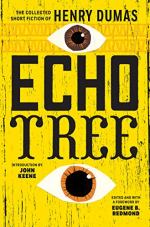|
This section contains 849 words (approx. 3 pages at 400 words per page) |

|
Echo Tree Summary & Study Guide Description
Echo Tree Summary & Study Guide includes comprehensive information and analysis to help you understand the book. This study guide contains the following sections:
This detailed literature summary also contains Quotes and a Free Quiz on Echo Tree by Henry Dumas.
The following version of this book was used to create the guide: Dumas, Henry. Echo Tree: The Collected Short Fiction of Henry Dumas. Coffee House Press, 2021.
Henry Dumas' Echo Tree is a collection of 31 short stories. Each story in the collection is written from a distinct point of view and in a unique form. The following summary employs a linear mode of explanation and relies upon the present tense.
In "Ark of Bones," Fish-hound undergoes a life-changing experience when his sanctified friend, Headeye, leads him to Deadman's Landing. While there, Fish-hound is shocked to witness the Bible story of Ezekiel acted out before him.
In "Echo Tree," two young boys learn how to communicate with a tree in order to contact the spirit world.
In "The Crossing," Bubba gets upset when his friend, Jimmy Croon, threatens to throw his sister over a bridge. When the boys start fighting, the bridge seemingly becomes animated with ghosts of the past.
In "Goodbye, Sweetwater," Layton Bridges is desperate to leave his hometown in Holly Springs, Arkansas to start a new life in New York. When a white man comes to the house to collect money from his aging grandmother, Layton's perspective begins to change.
In "A Boll of Roses," Layton Fields's infatuation with a girl named Rosemarie convinces him that changing his appearance will change his life. After Rosemarie is rude to him, Layton decides to stay in school and make his mother happy instead.
In "Double Nigger," four boys become terrified that a white homeowner will kill them when they draw water from his well.
In "A Harlem Game," when Mack asks his mother for money, he is harassed by one of her drunken card-playing companions.
In "Will the Circle Be Unbroken?," a group of black musicians discover the power of their music to defeat their white oppressors while playing in a Harlem club.
In "Strike and Fade," a group of friends realizes the importance of sticking together in order to achieve true freedom and social equality.
In "Fon," a white police officer nearly kills a young black boy named Fon for being fearless. Before the officer can shoot his gun, Fon's brother kills him with arrows.
In "The Marchers," a group of spirited protestors fails to regard the needs of one prisoner chained by the past.
In "The Eagle the Dove and the Blackbird," a blackbird outsmarts an eagle and a dove in order to secure his freedom.
In "Scout," an elderly man retells a story from his past about fleeing a man who was following him. He uses the story to communicate a lesson about freedom to the narrator.
In "Harlem," Harold wanders Harlem, unable to engage in the protests occurring on the city streets.
In "The University of Man," after years of repairing watches, Tyros ventures off to get an education. While in the east, he encounters a curious man who teaches him about knowledge, intellect, mystery, and the soul.
In "Rope of Wind," Johnny B desperately tries to save another of his friends from being killed by violent white men.
In "Children of the Sun," a group of boys buries their friend's dead dog.
In "Devil Bird," a young boy is shocked when the Devil and God show up at his house to play cards with his parents and grandfather.
In "Invasion," William's post traumatic stress disorder convinces him that the neighborhood children's war game is a reality.
In "The Lake," a man talks to a lake. The lake tells him to thank her for her gifts.
In "The Distributors," Carl is unnerved when his friend Kenny agrees to work for a nefarious company.
In "Six Days You Shall Labor," a young boy gets worried when his friends decide to pick pecans from a white man's fields on a Sunday.
In "The Man Who Could See Through Fog," Smithy gets a new job running a fogger machine at a military base. Despite the toxic and ineffective nature of the fogger's chemicals, Smithy's bosses require him to run the tractor constantly. He loses his job when the machine malfunctions.
In "The Voice," a group of young boys mourns their friend Spencer's death. His passing causes them to question their belief in God.
In "Thalia," a lover writes a book of songs to his absent lover, Thalia.
In "Rain God," a group of boys thinks the Devil is chasing them when they see that the sun is shining during a rainstorm.
In "The Bewitching Bag," when a dead man and the Devil's daughter escape from Hell, the Devil unsuccessfully tries to recapture them.
In "My Brother, My Brother!," two brothers concoct plans to escape the invaders. When the plans fail, one brother has to kill another.
In "The Metagenesis of Sunra," Sunra uses his music to save the Redpeople and the Bluepeople from their oppressors, the Wofpack.
In "Riot or Revolt?," Harold is moved when he encounters a collection of paintings in the basement of a Harlem bookstore. He imagines the paintings coming to life and joining in the fight for justice on the streets.
Read more from the Study Guide
|
This section contains 849 words (approx. 3 pages at 400 words per page) |

|



